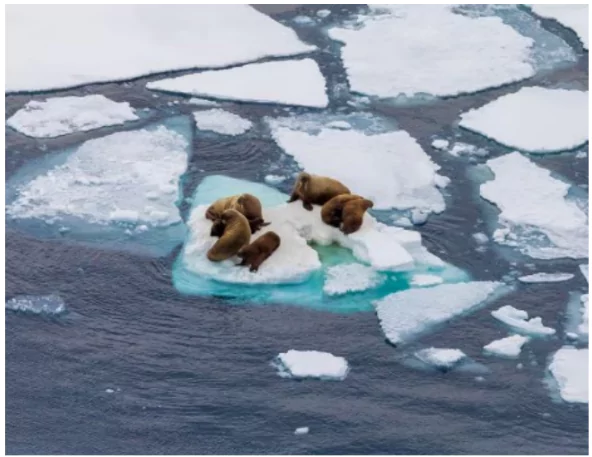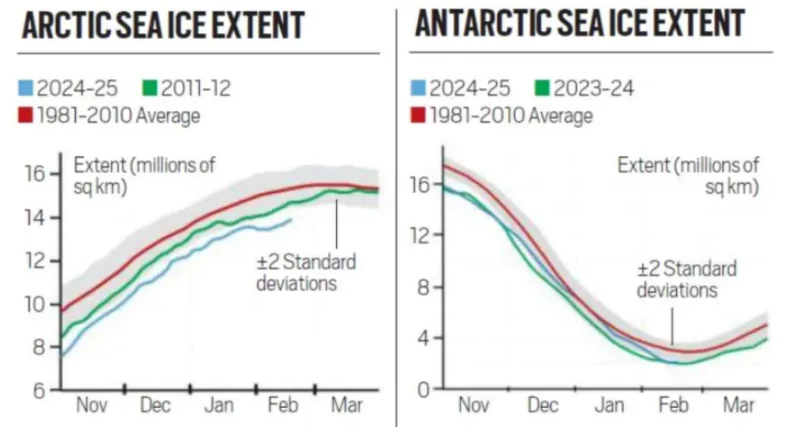In early February 2024, global sea ice cover dropped to 15.76 million sq km, breaking the previous record low of 15.93 million sq km set in early 2023.
- Data Source: Analysis by the BBC using records from the U.S. National Snow and Ice Data Center (NSIDC).
What is Sea Ice?

- Sea ice is floating ice found in polar regions.
- It expands in winter and melts in summer, but some portion remains throughout the year.
- It is different from icebergs, glaciers, ice sheets, and ice shelves, which originate on land.
- Why is Sea Ice Important?
- It helps cool the planet by trapping heat in the ocean and preventing it from warming the air above.
- A decline in sea ice cover can lead to higher global temperatures and severe environmental consequences.
- Ecosystem and biodiversity: Sea ice offers habitat for marine species and supports survival of organisms such as algae.
- Economic activities: sea ice affects distribution and abundance of fish populations, as it provides shelter for fish larvae and offers protection from predators (such as seals and polar bears) and harsh environments.
- It ultimately affects commercial fishing.
- Resource extraction: The retreat of sea ice has opened the way for extracting oil and gas from inaccessible areas.
Trends in the Arctic and Antarctic Sea Ice
Arctic Sea Ice
- The Arctic ice cover is at its lowest recorded extent for this time of year.
 Since the late 1970s, an average of 77,800 sq km of Arctic ice has been lost annually.
Since the late 1970s, an average of 77,800 sq km of Arctic ice has been lost annually.- Between 1981-2010, Arctic ice shrank by 12.2% per decade (September minimum levels, as per NASA).
- In recent years, warmer ocean temperatures and delayed freezing have worsened the decline.
Antarctic Sea Ice
- The Antarctic initially showed a slight increase in sea ice cover until 2015.
- However, between 2014-2017, the Antarctic lost 2 million sq km of ice—four times the size of Spain.
- The 2023 Antarctic sea ice extent was 2 million sq km below normal levels, marking a historic low.
- Even in 2024, Antarctic sea ice was 1.55 million sq km below the 1981-2010 average maximum extent.
Reasons for the Decline
- Rising Air and Ocean Temperatures
- Warmer air and ocean temperatures have delayed freezing and increased melting.
- In the Arctic, Hudson Bay experienced late freezing due to unusually warm waters.
- In the Antarctic, warmer air has melted the edges of ice shelves, accelerating ice loss.
- Stronger Winds and Storms
- Antarctic ice is thinner and more mobile due to its oceanic surroundings, making it vulnerable to ice-breaking winds.
- Storms in the Arctic Barents and Bering Seas have further broken apart ice.
- Increased Freshwater from Melting Ice
- Melting ice introduces freshwater into the ocean, disrupting salinity balance and reducing ice formation.
Consequences of Sea Ice Loss
- Increased Global Warming
- Less ice means more ocean water absorbs solar heat, leading to higher temperatures.
- Polar regions are warming faster than the rest of the world due to this effect.
- Disruption of Ocean Circulation
- The inflow of freshwater from melting ice slows down ocean currents, impacting global climate patterns.
- This can destabilize ice shelves, disrupt the marine food chain, and alter weather systems.
![]() 21 Feb 2025
21 Feb 2025


 Since the late 1970s, an average of 77,800 sq km of Arctic ice has been lost annually.
Since the late 1970s, an average of 77,800 sq km of Arctic ice has been lost annually.